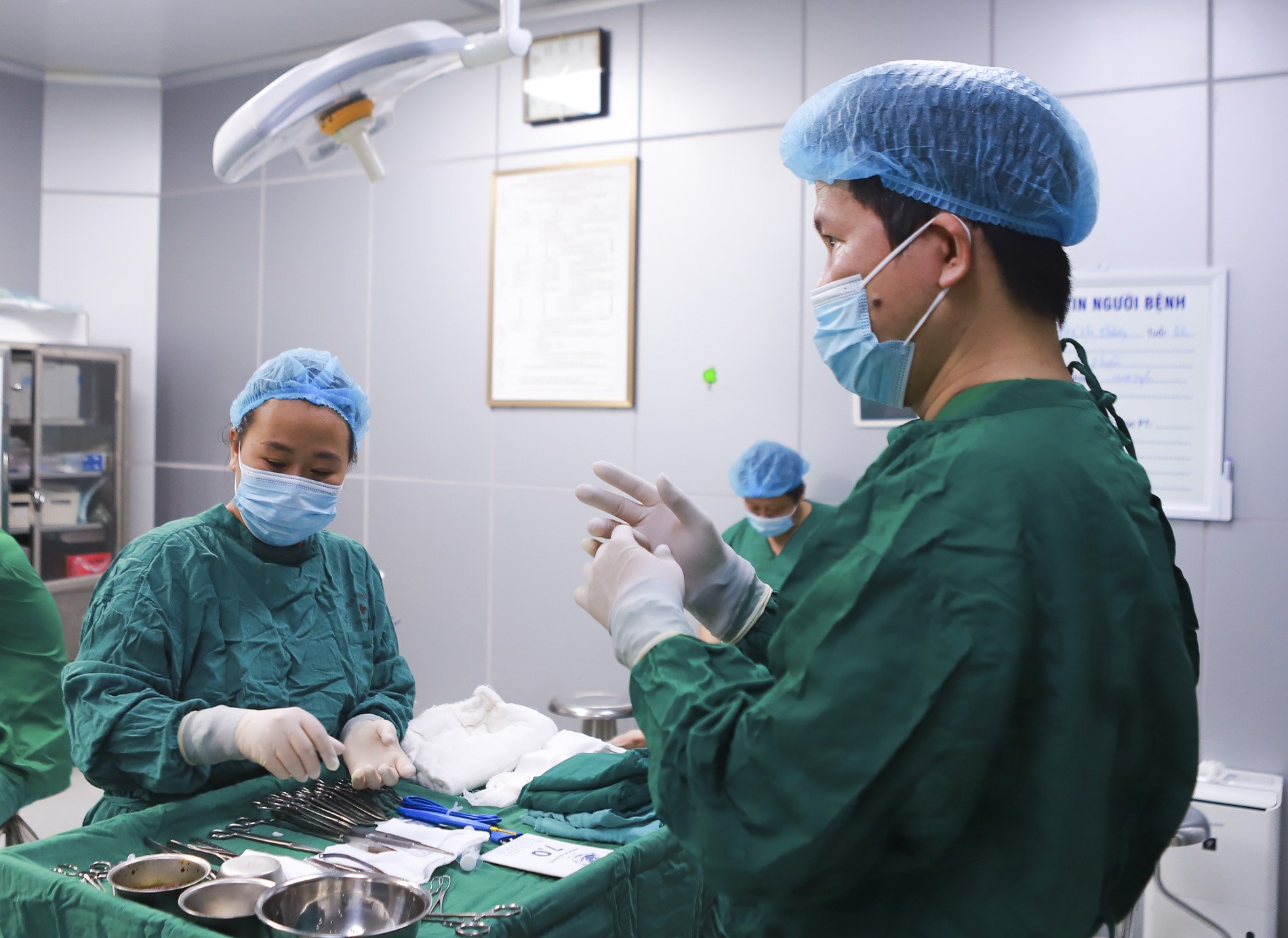
Although he follows a special exercise regimen to lose weight, the excess skin hanging over his body has affected his life - Photo: Provided by the character
Why does weight loss cause excess skin?
Having diabetes since childhood, leading to metabolic disorders, his body accumulates fat differently than people with normal health. Nhan (27 years old, living in Ho Chi Minh City) is 1m67 tall but weighs 230kg.
Being overweight makes it difficult for Nhan to walk, has thick black thorns covering his skin, his health is declining, complications from hernia and spinal degeneration make it impossible for the young man to bend down.
When he noticed signs of declining health, Nhan was determined to lose weight following a specific plan. Nhan also gave up foods that caused weight gain, and at the same time practiced to improve his weight, respiratory system and digestion.
After a period of effort, Nhan lost from 230kg to 170kg. Because he lost 60kg, Nhan's body had a lot of excess skin and fat, the layers of skin and fat were bulging and sagging. He also set a goal of losing about 150kg, reaching the 80kg mark.
Explaining the condition of excess skin after weight loss, Dr. Tong Hai, head of the Department of Microsurgery and Reconstruction, Center for Plastic Surgery and Reconstruction, National Burn Hospital ( Hanoi ), said that excess skin often appears when losing a lot of weight in a short period of time.
The nature of excess skin after weight loss is that your skin normally stretches to cover all the fat in your body. When you lose weight, this skin loses elasticity, causing the skin to sag.
Certain factors increase the likelihood of having excess skin, such as losing weight too quickly, which leaves the skin with fewer elastic fibers, making it weaker and less able to retract.
In addition, it is also due to the age factor. Similar to other organs in the body, as we age, collagen will degenerate and weaken. This explains why older people often have wrinkled skin.
"Thanks to the elasticity of the skin, for people who lose moderate weight and are young, this excess skin will disappear after a while. However, for some people with too much excess skin due to heavy weight loss and old age, surgery may be needed to remove it," Dr. Hai informed.
"In this case, this guy will have to have surgery to remove excess skin. However, Nhan's current BMI is nearly 60, which does not meet the criteria for surgery under anesthesia and removing excess skin and fat. Therefore, in this case, there is currently no indication for surgery to remove excess skin and fat.
When Nhan's weight drops to about 100-115kg, BMI from 35 - 40, surgery is possible," said Mr. Hai.
How to reduce excess skin when losing weight?
According to Dr. Hai, to limit excess skin after weight loss, you need to pay attention to losing weight slowly. In addition, during the weight loss process, you should exercise continuously to burn fat naturally, combined with wearing shaping shirts and shaping socks immediately after the exercise process.

Doctor Tong Hai performs surgery at the National Burn Hospital - Photo: Provided by the hospital
This helps when excess fat is lost, the elasticity of the skin muscles is evened out, helping to minimize excess skin. You should also supplement micronutrients that increase skin elasticity such as collagen, vitamins E and C.
In the case of people losing weight quickly in a short period of time, the amount of excess skin is too large, depending on the condition, the doctor will have appropriate indications. In which, surgery can be performed to remove excess skin.
Almost all excess skin on the body can be removed, except for some areas that should not be operated on, such as the joints. Because cutting too much skin in this area can cause scarring and contracture, limiting joint movement.
Mr. Hai also warned that surgery to remove excess skin is a difficult technique, with the potential risk of slow wound healing, or even failure to heal, which can leave ugly scars after surgery.
"Therefore, when deciding to remove excess skin after losing weight, you need to consult a plastic surgeon. Before surgery, the doctor will advise you on the pros and cons and will plan a specific surgery.
At the same time, before surgery, a full examination and testing must be performed, because the anesthesiologist ensures how long the anesthesia will last and coordinates with the surgeon to ensure the excess skin removal process is safe and effective," Dr. Hai recommended.
Source


![[Photo] Panorama of the Opening Ceremony of the 43rd Nhan Dan Newspaper National Table Tennis Championship](https://vphoto.vietnam.vn/thumb/1200x675/vietnam/resource/IMAGE/2025/5/19/5e22950340b941309280448198bcf1d9)

![[Photo] President Luong Cuong presents the 40-year Party membership badge to Chief of the Office of the President Le Khanh Hai](https://vphoto.vietnam.vn/thumb/1200x675/vietnam/resource/IMAGE/2025/5/19/a22bc55dd7bf4a2ab7e3958d32282c15)

![[Photo] General Secretary To Lam attends the conference to review 10 years of implementing Directive No. 05 of the Politburo and evaluate the results of implementing Regulation No. 09 of the Central Public Security Party Committee.](https://vphoto.vietnam.vn/thumb/1200x675/vietnam/resource/IMAGE/2025/5/19/2f44458c655a4403acd7929dbbfa5039)
![[Photo] Close-up of Tang Long Bridge, Thu Duc City after repairing rutting](https://vphoto.vietnam.vn/thumb/1200x675/vietnam/resource/IMAGE/2025/5/19/086736d9d11f43198f5bd8d78df9bd41)


























![[Photo] Prime Minister Pham Minh Chinh inspects the progress of the National Exhibition and Fair Center project](https://vphoto.vietnam.vn/thumb/1200x675/vietnam/resource/IMAGE/2025/5/19/35189ac8807140d897ad2b7d2583fbae)


























































![[VIDEO] - Enhancing the value of Quang Nam OCOP products through trade connections](https://vphoto.vietnam.vn/thumb/402x226/vietnam/resource/IMAGE/2025/5/17/5be5b5fff1f14914986fad159097a677)



Comment (0)